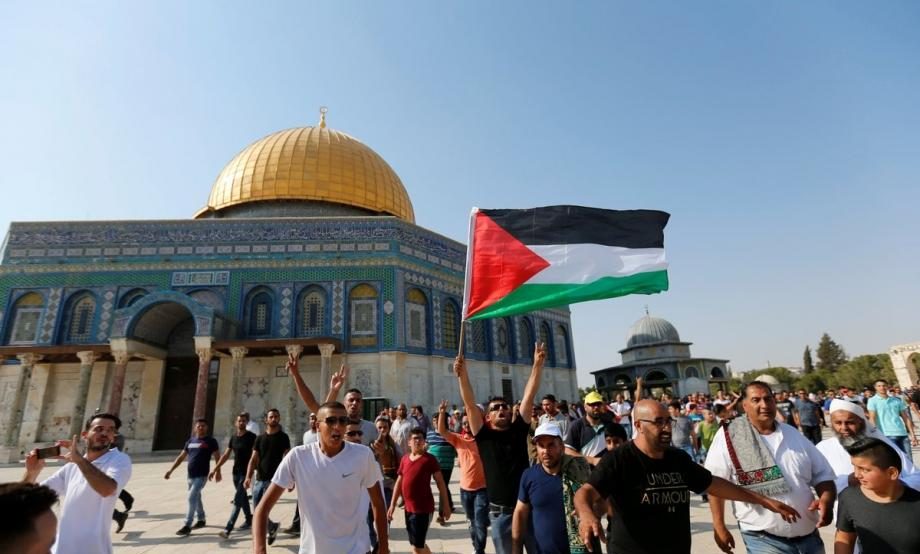On Monday, Qatar’s foreign ministry issued a statement condemning the Israeli storming of the Al Aqsa Mosque.
Qatar and Egypt have reportedly been attempting to prevent new escalations in Gaza by holding talks with Palestinians and Israelis, a Palestinian official privy to the matter told Reuters on Wednesday.
The report comes amid fears of fresh escalations in the besieged Palestinian city following the killing of at least six Palestinians across the West Bank and Gaza on Tuesday, during raids by the Israeli Occupation Forces (IOF).
Yousef Radwan, a 25-year-old in Gaza, was among those killed during the raids.
Cairo, which shares diplomatic ties with Tel Aviv, and Doha—the host of Hamas’ political office—have been at the forefront of de-escalation efforts in the Gaza Strip. Both parties have mediated a number of ceasefires that have brought to an end numerous Israeli bombardments of the city in recent years.
Gaza was subjected to a deadly Israeli bombing campaign between 8-to-13 May, in which the IOF killed 33 Palestinians, including children. The five-day brutal aggression ended following intensive discussions between Qatar, Egypt and the United Nations.
However, Qatar has not publicly commented on its recently reported joint efforts with Egypt.
The IOF provoked further escalations on Wednesday after shutting the Beit Hanoun, or Erez, crossing between Gaza and Israel, blocking at least 18,000 of workers from their daily commute to jobs outside of the blockaded city.
That came following days of Hamas-backed protests in the enclave over the occupation’s mistreatment of Palestinian prisoners and the provocative storming of the Al Aqsa mosque compound by Israeli settlers.
The IOF responded violently to the protests by firing explosives on Palestinian demonstrators.
Egypt issued a statement on the closure of the key crossing in Gaza, calling on Israel to prevent the “collective punishment” of the besieged city’s population.
The Spokesman for Gaza’s Ministry of Labour Ayman Abu Krayyem said 8,000 workers have been stranded at the crossing since the Israeli closure, Reuters reported.
Analysts have drawn links between the recent protests and similar demonstrations in 2018 and 2019, widely known as the ‘Great March of Return’, during which the IOF killed more than 350 Palestinians. At the time, Qatar, Egypt and the UN brokered an unofficial agreement to lift some economic restrictions on Gaza.
This week’s protests were also held during the Jewish New Year, known as “Rosh Hashanah”, during which large numbers of Jewish settlers enter the Al Aqsa Mosque compound under the protection of the Israeli government, which prevents the native Palestinian population from entering the holy Muslim site.
On Monday, Qatar’s foreign ministry issued a statement condemning the Israeli storming of the Al Aqsa Mosque, slamming it as “a flagrant violation of international law and international legitimacy resolutions.”
“The Ministry of Foreign Affairs holds the Israeli occupation authorities solely responsible for the cycle of violence that will result from these systematic escalation policy against the Palestinian people and their lands and holy sites. The Ministry urges the international community to take urgent action to stop these attacks,” the statement added.
Qatar slams Israeli occupation
Qatar has repeatedly voiced its unwavering stance against the ongoing Israeli occupation of Palestine, condemning its harrowing human rights violations of Palestinians.
Unlike some of its neighbours, namely Bahrain and the United Arab Emirates, Qatar has long refused to normalise with Israel.
Meanwhile on Tuesday, Qatar’s Amir Sheikh Tamim bin Hamad Al Thani dedicated a large portion of his speech before the United Nations General Assembly to highlight the need to end Israel’s occupation of Palestine.
“If we truthfully constitute an international community, and not a merely diverse entities, it must be our duty to strive towards ending the injustice afflicting them, at least in accordance with what is required by the resolutions of this body, and entailed by international law,” the Qatari leader said.
Sheikh Tamim added that “it is not acceptable for the Palestinian people to remain prisoners of the Israeli settler occupation arbitrariness.”
“You have to bear in mind that the failure of the international organisation to take actions against the occupation provided and continues to provide the opportunity for Israel to undermine the foundations of the two-state solution by means of settlement expansion until the occupation has brazenly taken the form of an apartheid regime in the broad daylight of the twenty-first century,” Amir Tamim noted.







